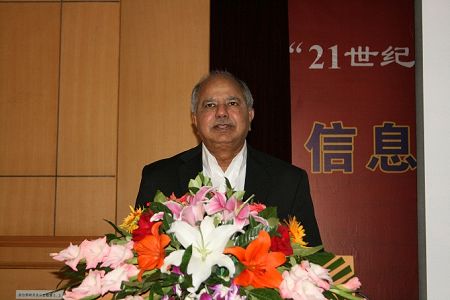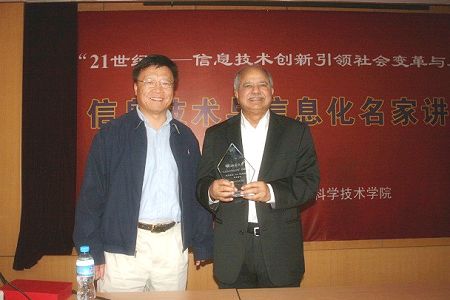News & Events | About PKU News | Contact | Site Search
Peking University, Oct. 23, 2012: On the afternoon of October 17, the 1994 A.M. Turing Award Winner and Professor of Carnegie Mellon University (CMU) Raj Reddy visited the School of Electronics Engineering and Computer Science (EECS), Peking University (PKU) on invitation, and gave a lecture themed “Reflections on Early AI and CS at Stanford 1963-1969 and Beyond.”

From 1960, Reddy worked for IBM in Australia. Then he became an Assistant Professor of Computer Science at Stanford from 1966-69 before joining CMU. He is one of the early pioneers in Artificial Intelligence (AI) and Computer Science (CS). He received the 1994 Turning Award for his extraordinary contributions in AI.
In his lecture, Raj Reddy mainly introduced his early work in computer science, especially in the area of AI at Stanford University from 1963 to 1969, with a purpose of inspiring and guiding the students to explore fundamental sciences. In the past 50 years, CS has enjoyed rapid growth, and Raj Reddy felt blessed to have been growing up in this technical revolution. Raj Reddy vividly showed how the pioneering work in areas like robotics, computer vision, knowledge engineering, speech recognition and understanding, and computer music carried out at Stanford University influenced the development of AI and what was the feedback and choice of the era. Raj Reddy believed they had done a lot of exploration projects. Some of them, judged from today, were merely optimistic attempts and failed to succeed while some of the others, on the other hand, proved to be critical original work that deeply affected the development of AI till today.
In the Q&A session after the lecture, Raj Reddy shared his views on IT bubbles and the limit of the computing ability of Turning Machine. He also reflected the stories with some of his early students such as Kai-Fu Lee.
Professor Gao Wen of EECS, a member of the Chinese Academy of Engineering hosted the event. After the lecture, Gao Wen presented Raj Reddy with a crystal commemorative plaque as a gift.

Extended Reading
Raj Reddy is a member of the US National Academy of Engineering (NAE), and a fellow of the Institute of Electrical and Electronic Engineers (IEEE) and a fellow of the American Association for Artificial Intelligence (AAAI). He joined the Carnegie Mellon University faculty as an Associate Professor of Computer Science in 1969 and worked there since. He was the founding Director of the Robotics Institute from 1979 to 1991 and the Dean of School of Computer Science from 1991 to 1999. His main research interests are robotics, human-computer interaction and artificial intelligence. In 1994, Raj Reddy won the A.M. Turing Award, the highest award in the field of computer science. In 2006, he won the Vannevar Bush Award, which is the highest award of the National Science Foundation (NSF).
The ACM A.M. Turing Award is an annual prize given by the Association for Computing Machinery (ACM) to "an individual selected for contributions of a technical nature made to the computing community". It is stipulated that "The contributions should be of lasting and major technical importance to the computer field". The Turing Award is recognized as the "highest distinction in Computer science" and "Nobel Prize of computing".
Written by: Gao Hongfei
Edited by: Chen Long
Source: PKU News (Chinese)